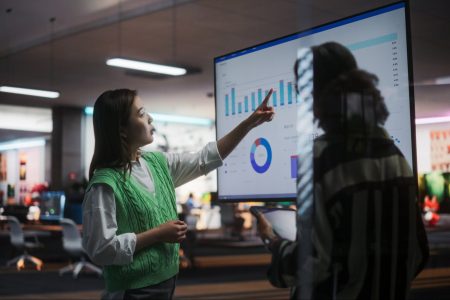SEO trends are evolving at an unprecedented rate, especially with AI shaking everything up. To stay relevant, marketers need to stay on their toes and understand what AI is doing to the landscape of SEO and how they can manipulate it to benefit their clients.
From voice search to the rise of AI, the trends shaping 2025 and beyond will hinge on how new features are forcing user behavior to change and adapt. Search engines will continue to strive for excellence, and marketers must be just as versatile and intuitive.
Conversational queries taking over conventional keywords
Voice command has been making waves in the past few years, with smart home appliances revolutionizing the way people interact with search engines. It is no longer odd to hear someone shout, “Alexa!” in a home where nobody is named Alexa, or “Siri!” or “Google!” These types of queries have changed SEO to be more receptive to a combination of words that essentially mean the same thing.
While incorporating this manually might have been tedious, the invention of automation ensures that these practices are applied seamlessly. Tools powered by natural language processing (NLP) allow marketers to focus on intent and context rather than rigid keyword structures.
Long-tail keywords, yay or nay?
There was a time when long-tail keywords were all the rag they continue to dominate the 2025 market.
AI can analyze search patterns and optimize content accordingly, ensuring that marketers tap into valuable long-tail keywords. For instance, phrases like “What’s the easiest way to cook pasta in under 15 minutes?” hold more weight than simple keywords like “cook pasta.” This evolution highlights the growing importance of semantic search.
Related: How AI Is Transforming Keyword Research
Mobiles before anything else
If a website’s layout isn’t mobile-friendly — or dynamic — Google will take that into account when displaying search results. Businesses need websites designed for mobile devices to rank highly on search engines.
Fast loading times continue to be a key requirement, but user experience is becoming equally critical. Mobile users expect intuitive navigation, clear calls to action and minimal clutter. In a world where smartphones dominate, failing to optimize for mobile could be a costly mistake.
Adapting to the landscape of the people
The internet is constantly changing, driven by shared experiences in the real world that spill over into the nuances of the digital one. Consider the TikTok ban, for example. Users flocked to RedNote, a Chinese-managed platform, igniting a cultural exchange in real-time.
These rapid shifts highlight the importance of understanding user behavior. SEO strategies must be adaptable, leveraging analytics tools to monitor trends and respond quickly to new platforms or behaviors.
Related: Why Automation is Crucial for all Small Business Owners
The rise of visual search
With increased interest in video and image-based content, visual search optimization is becoming increasingly important. Google Lens and similar tools are changing the way people shop and search. Imagine seeing an item you like, snapping a photo and finding it online instantly.
To capitalize on this, businesses must optimize their visual content with proper alt text, descriptive file names and relevant metadata. This will ensure their images and videos are discoverable and rank highly in visual search results.
AI and automation in SEO
Artificial intelligence is revolutionizing SEO, providing marketers with powerful tools for analyzing data, identifying trends and optimizing campaigns. Tools like AI-powered chatbots and content generators are making it easier than ever to produce high-quality content at scale.
AI also plays a crucial role in personalizing search results. Algorithms can analyze user behavior to deliver customized experiences, making SEO more effective and user-centric. However, with these advancements comes a responsibility to maintain ethical practices, such as ensuring transparency and avoiding the overuse of AI-generated content.
The future of E-A-T: Expertise, authority and trustworthiness
As misinformation continues to plague the internet, search engines are placing greater emphasis on E-A-T (Expertise, Authority, Trustworthiness). In 2025, content that demonstrates credibility and authority will outperform generic or poorly researched material.
Marketers must invest in creating high-quality, well-researched content that establishes their brand as a trusted resource. This includes leveraging expert opinions, citing credible sources and maintaining transparency about authorship.
Related: What Small Businesses Can Learn from Yelp’s Trend Tracker
The integration of augmented reality (AR) and virtual reality (VR)
Looking ahead, AR and VR could open new doors for SEO. Imagine searching for nearby restaurants and receiving real-time AR overlays with reviews, menu options and directions. These technologies could transform local SEO, requiring marketers to rethink how they optimize for location-based queries.
While still in its infancy, this trend represents a significant opportunity for forward-thinking businesses to gain a competitive edge. By embracing AR and VR early, brands can position themselves as innovators in their industries.
The bottom line
SEO in 2025 is all about adaptability. From voice search to AI-driven personalization, the landscape is evolving rapidly. Marketers who stay ahead of these trends, invest in user-focused strategies and embrace innovation will thrive.
The future of SEO lies in understanding users’ ever-changing needs and finding creative ways to meet them. Those who succeed in this will drive traffic and foster lasting connections with their audiences.
Read the full article here










